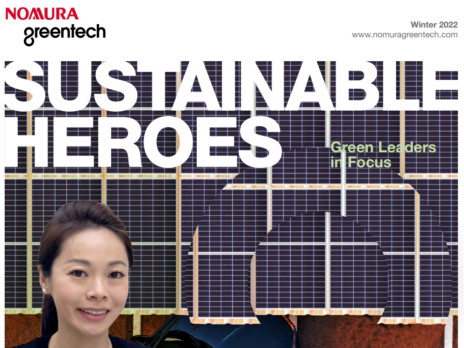

Achieving net-zero greenhouse gas emissions by 2050 will require more than $150trn in investment in the energy transition, along with rapid advances in consumer behaviour, policy and technological innovation.
If the prospect of this green push seems daunting, one can take comfort from the fact that it is already well underway. In 2009, when Jeff McDermott first had the idea of setting up a sustainability-focused investment bank, it seemed inconceivable that the electricity sector could ever decarbonise.
“Many people thought that renewable electricity generation would simply never materialise,” says Nomura’s global co-head of investment banking. “Thirteen years later, it’s just a matter of boots and shovels. It’s going to happen.”
For McDermott, the amount that has already changed since he founded Greentech Capital Advisors (acquired by Nomura in 2020) is proof that visions of a low-carbon future can be realised. “The level of market knowledge and detailed focus on the part of investors is light years better,” he says. “Ten years ago, a lot of the early-stage investors we were talking to about funding a sustainable company came from areas like the internet or a venture capital background, and they were just speculating on the energy transition.”
“Now, the capital has organised and raised specialised funds. Extremely talented women and men have dedicated years to understanding this transition. As a result, they’re making better decisions and backing better companies.”
Systems-level change
Of course, it isn’t just the energy sector that needs cleaning up. The world is now turning its attention to new technologies and sectors. Sustainable fuel production must not only be dramatically scaled up, but also adopted in areas where it can make the biggest difference such as heavy industry and maritime transportation. Developing batteries capable of powering 10,000lb trucks is another hurdle, as is cutting food waste and tackling carbon-and-water-intensive agricultural practices.
Fortunately, capital is now being mobilised to support green causes faster than ever before as sustainable investment strategies begin generating real Alpha. Innovative tech companies are thriving in this environment and, in McDermott’s view, many of the early solutions to our carbon concerns are already out there.
“We work with one business which is the leader in behind-the-metre commercial and industrial energy storage systems, but it’s really a software company,” he says by way of example. “It enables building owners to take signals from the utility to understand the price of keeping their building electrified or heated at certain times during the day. Then it switches energy supply between the storage and the grid system to lower that building’s bills.”
For McDermott, data-driven system optimisation solutions like this are the next step along the path to sustainability. In the long term, the centrally generated electricity infrastructure that has been in place for a century will be unrecognisable.
“We’ve always talked about the powerful influence of integrated systems because these technologies are all going to integrate eventually. Next will come smart homes where you don’t run your dishwasher or your water heater during certain hours of the day when energy is expensive. That will enable us to have a more transactive grid, which will make the intermittency of renewables much more palpable and economic.
“And then vehicle-to-grid is going to become a big thing, and people are going to power their homes with their EV [electric vehicle] battery during times of the day when electricity is expensive to generate. At night, when electricity is really cheap and everybody’s sleeping, the cars will recharge for the next day.”
Funding the energy transition
When technological solutions are in place, they must be backed by strong investment flows and voter-driven public policies. These three forces – technology, capital and policy – have begun to converge in support of renewable energy generation since a spate of governments announced more ambitious clean energy goals.
As a result, global renewables capacity is forecast to rise more than 60% by 2026 relative to 2020 levels, reaching over 4800GW – equivalent to the current total global power capacity of fossil fuels and nuclear combined.
Further good news on the policy side came in August 2022, when the US passed the landmark Inflation Reduction Act, which earmarked $369bn for climate change mitigation initiatives.
“It reminds me of a wise phrase Winston Churchill is reputed to have said when asked if America would ever enter the war: ‘Americans will always do the right thing, only after they have tried everything else’,” McDermott observes.
“The US has been a laggard, and Europe has led the way. But America has finally put in place a ten-year policy which gives investors real certainty as to what the ground rules are. Now, US entrepreneurs and investors will lean in, which will create a lot of demand for these products from global companies which manufacture outside America, too.”
Europe is facing a harsh winter, and warnings of electricity rationing and gas shortages abound. For McDermott, this too could be a pivotal moment. “Yes, there are headwinds right now. But when we look back in five years, we’ll say that this is where we really accelerated the energy transition. Because it made it completely clear that there is no other way. We can’t hold ourselves hostage to irresponsible global actors who have their own agenda.”
As far as markets are concerned, however, it’s getting harder for innovative young companies to fundraise effectively through traditional public market channels. McDermott sees small-cap IPOs remaining more challenging and infrequent.
The 1990s in the US witnessed around 5,700 IPOs, more than the following two decades combined. Cumulative deal value, however, increased from about $480bn in the ’90s to nearly $570bn in the 2000s – and is even higher now. Equity capital markets are less receptive to small-cap IPOs, but private equity has picked up the slack through dedicated energy transition or sustainability funds.
“I think that we’re going to see these companies stay private for longer and grow with outside capital before they can go public,” McDermott says. “In addition, innovative fast growth companies may opt for strategic M&A to truly accelerate their growth. As an example, perhaps they can independently scale their business to $500m in revenues. But if they want to scale to revenues of $5bn, often merging into a large global company which has tremendous synergies makes more sense.”
“The good news is that these big companies now really understand the business opportunity. One of our expressions is ‘green has to be green’. In other words, sustainable technology and infrastructure have to be profitable. The big players are paying much closer attention than they were five years ago, and are more interested in acquisitions to add to their portfolios. They are increasingly aware of these terrific business opportunities.”
Take a transition lead
As evidenced by its acquisition of Greentech Capital Advisors, Nomura is committed to making those deals happen. It has closed $133bn worth of M&A in the clean energy sector to date by advising on numerous solar, green hydrogen and decarbonisation deals. It also played a leading role in the EU’s inaugural Green Bond.
Greentech, meanwhile, has been incorporated into a new sector team: Greentech, Industrials and Infrastructure (GII). This integrated ESG advisory group is comprised of more than 160 bankers around the world, dedicated to ten major sectors, including sustainable materials, renewable energy, advanced transportation, energy information technology, agtech, water technology, environmental services and technologies, and digital infrastructure.
Nomura has set a target of deploying $125bn in sustainable financing by March 2026. At a corporate level, Nomura has committed to net zero for its own operations by 2030, and for its lending and investment pathways by 2050.
“Among financial institutions, there are two camps: there are those for whom sustainability is really core to their business philosophy and practices, and there are those for whom it’s a marketing campaign,” says McDermott. “For Nomura, it’s absolutely key to what we believe and what we’re doing.”
In his role as global co-head of investment banking, McDermott regularly liaises with those behind climate-leading companies: what qualities consistently shine through in up-and-coming sustainable leaders?
“I think it’s dogged resilience,” he replies. “Of all the people that we’ve spoken to who have built a business, nobody has ever said ‘wow, this just took off. It was easy.’ It’s more like ‘we almost went bankrupt, then we had to pivot, then the government did this, I haven’t slept for three years…’ “It comes down to a certain equanimity; the ability to say, ‘I don’t know what the answer is, but I’m willing to find it.’” McDermott adds, “Everyone at Nomura believes, like these sustainable leaders – it can be done.”







